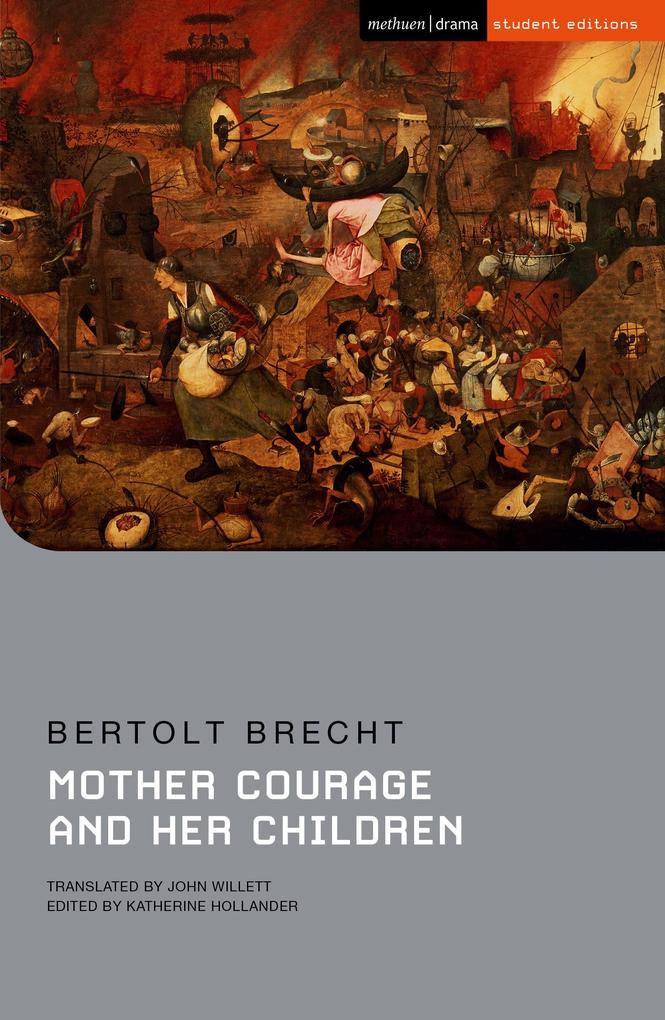
Zustellung: Di, 26.11. - Do, 28.11.
Sofort lieferbar
VersandkostenfreiBestellen & in Filiale abholen:
This new Student Edition, featuring the classic John Willett translation of the play, includes an introduction by Katherine Hollander, which explores the following:
* Contexts (Thirty Years War, 1618-1648; World War II and exile; sources; influential figures such as Brecht, Margarete Steffin, Helene Weigel and Karin Michaelis)
* Themes (war; nature; capitalism)
* Dramatic devices (epic theatre)
* Production history and critical reception
* Academic debate (Marxist, feminist and postmodernist)
* Further study
Widely regarded as Brecht's best work, Mother Courage and her Children was written in 1938-9 and received its premiere in Zurich in 1941. Mother Courage - a canteen woman serving with the Swedish Army during the Thirty Years War (1618-48) - follows the armies, selling provisions and liquor to the troops. Both her sons die in the war and her dumb daughter, Kattrin, is mortally wounded as she beats a drum to warn the town of Halle of an impending attack. Yet, all the while, Mother Courage continues her travels with her wagon, indomitably businesslike, calculating how she can make material profit from the war and turn conflict into capital.
* Contexts (Thirty Years War, 1618-1648; World War II and exile; sources; influential figures such as Brecht, Margarete Steffin, Helene Weigel and Karin Michaelis)
* Themes (war; nature; capitalism)
* Dramatic devices (epic theatre)
* Production history and critical reception
* Academic debate (Marxist, feminist and postmodernist)
* Further study
Widely regarded as Brecht's best work, Mother Courage and her Children was written in 1938-9 and received its premiere in Zurich in 1941. Mother Courage - a canteen woman serving with the Swedish Army during the Thirty Years War (1618-48) - follows the armies, selling provisions and liquor to the troops. Both her sons die in the war and her dumb daughter, Kattrin, is mortally wounded as she beats a drum to warn the town of Halle of an impending attack. Yet, all the while, Mother Courage continues her travels with her wagon, indomitably businesslike, calculating how she can make material profit from the war and turn conflict into capital.
Inhaltsverzeichnis
Chronology
Contexts (Thirty Years War, 1618-1648; World War II and exile; sources; influential figures such as Brecht, Margarete Steffin, Helene Weigel and Karin Michaelis)
Themes (War; Nature; Capitalism)
Dramatic Devices (Epic Theatre)
Production History and Critical Reception
Academic Debate (Marxist, feminist and postmodernist)
Further Study
MOTHER COURAGE AND HER CHILDREN
Contexts (Thirty Years War, 1618-1648; World War II and exile; sources; influential figures such as Brecht, Margarete Steffin, Helene Weigel and Karin Michaelis)
Themes (War; Nature; Capitalism)
Dramatic Devices (Epic Theatre)
Production History and Critical Reception
Academic Debate (Marxist, feminist and postmodernist)
Further Study
MOTHER COURAGE AND HER CHILDREN
Mehr aus dieser Reihe
Produktdetails
Erscheinungsdatum
16. Juni 2022
Sprache
englisch
Auflage
2. Auflage
Seitenanzahl
88
Reihe
Methuen Student Editions
Autor/Autorin
Bertolt Brecht
Übersetzung
John Willett
Verlag/Hersteller
Originalsprache
deutsch
Produktart
kartoniert
Gewicht
118 g
Größe (L/B/H)
126/195/11 mm
Sonstiges
Paperback
ISBN
9781350178533
Entdecken Sie mehr
Bewertungen
0 Bewertungen
Es wurden noch keine Bewertungen abgegeben. Schreiben Sie die erste Bewertung zu "Mother Courage and Her Children" und helfen Sie damit anderen bei der Kaufentscheidung.

































